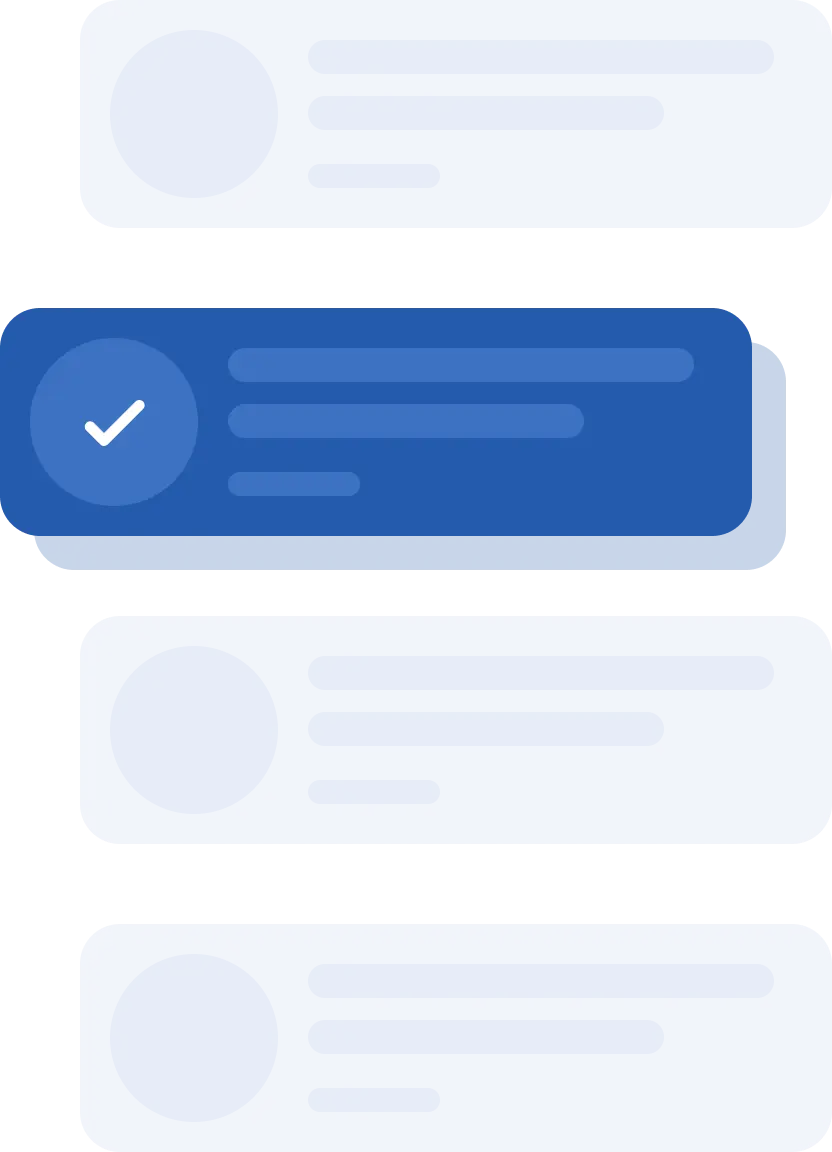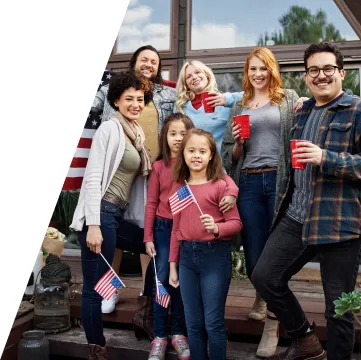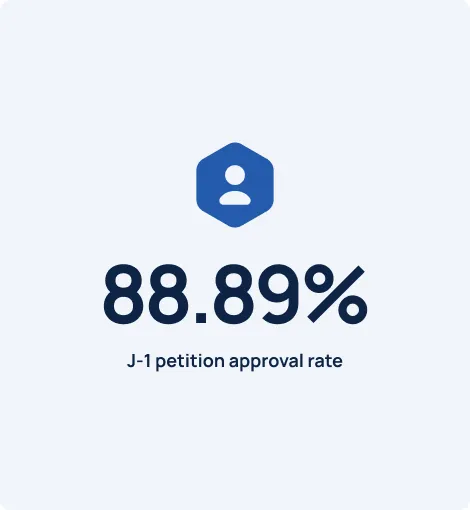

Discover the J-1 Visa
The J-1 Visa is a cultural exchange program in the United States that offers learning, training, and professional development opportunities to people from around the world.
This program allows participants to immerse themselves in American culture, acquire new skills, and establish international connections.
Benefits of the J-1 Visa
The J-1 visa offers a range of benefits for both participants and
exchange program sponsors. Some key benefits include:
Expand your horizons
and enrich your experience through the J-1 Visa
* Remember: the program will have a maximum duration of 12 months and you will have to wait 2 years to renew it.
J-1 visa sponsors
The sponsor of a J-1 visa program is the entity that is responsible for the foreign student or professional during their stay in the United States
Their role is to make sure that the participant meets all program requirements and maintains good behaviour.
Sponsors are also responsible for following up on the J-1 visa participant to ensure that they return to their home country upon completion of the program.
Process and work authorization
If the visa holder wishes to change sponsors, they must request a new form DS-2019 through their new sponsor. Once you receive the new form, you will need to submit it to the US Citizenship and Immigration Services (USCIS) to obtain work authorization.
If you are granted authorization, you will be issued a J-1 visa valid for the remainder of the period originally specified on the DS-2019 form. However, this transfer is not allowed in all J1 categories.
Program categories for J-1 visa
Students
Study programs, professional practices, summer camps and workshops.
Artists and Entertainers
Individual or group performances, exhibitions, movies and television shows, concerts and tours.
Teachers
Teacher exchanges, international visitors in academic programs and specialized educators.
Journalists
Journalists covering news for foreign media, including summer children’s programmes.
Researchers
Scientific or technological studies and research, medical or health consultancy and participation in conferences or seminars.
Medical personnel
Medical specialists serving underserved rural areas, medical or health consulting, participation in medical training programs.
Youth groups
Sponsorship programs for groups of children or young people, as well as for group monitors.
Au Pair
The purpose of this visa is to allow young adults (ages 18-26) the opportunity to spend a year in the United States caring for children and performing light household chores
Athletes and Coaches
Training programs and sports competition, including summer programs for children.
J-1 visa requirements
Valid employment offer or program invitation
To apply for a J-1 visa, you must have a valid offer of employment or invitation to participate in a program by a designated agency.
Sponsors designated by U.S. Department of State
Sponsors are designated by the US Department of State. Program agencies and nonprofit organizations, state and local governments, and universities may be designated sponsors.
Up to 4.5 years with extensions
This visa is granted for the period of time necessary to complete the objective of the trip,up to a maximum of four and a half years. However, the visa can be extended under certain circumstances.
Get guidance and assistance in your J-1 Visa application process
Apply for your J-1 Visa today
If you're seeking a unique opportunity to expand your horizons, acquire new skills, and immerse yourself in American culture, the J-1 Visa may be the right option for you.
Make sure to meet the established requirements and seek appropriate guidance to facilitate your application process.
How to apply for J-1 visa
At Visa Franchise, we can put you in touch with the right partner to help you
through the entire process.
Their team of experts will provide you with personalized advice, and provide you with all the
information you need to succeed in your J-1 Visa application while our team will be able to assist
you with other items of your transition to the United States through our One Stop Solution offering.
* To apply for this visa for the first time, you must fill out and submit form DS-2019.
** If you wish to extend your J-1 visa, you must fill out form I-765 and pay the corresponding fee,
as well as submit a letter from the program sponsor confirming that you continue to participate in
the program.

Documents to consider
The US consulate will probably ask you to bring:
Education and training of the applicant
The professional experience of the applicant
Proficiency in the English language or a commitment to learn the language during the program
The applicant’s ability to adapt to an unfamiliar environment and work as a team
Academic qualifications and/or previous experience in the field of study, if applicable
Personal and professional background, as well as references
The availability of resources for the program in the applicant’s country of origin
How long does it take to get a J-1 visa?
The waiting time for a visa appointment depends on the consular office and the country. In general, it is recommended to schedule your appointment as soon as possible after you have received the DS-2019 form
In some countries appointments can be scheduled well in advance, while in other countries appointments can fill up quickly.
Wait times for exchange visa appointments:
Mexico
At the consular office in Mexico City,
the wait is 2 calendar days
Colombia
At the consular office in Bogotá,
The wait is 35 calendar days
Argentina
At the consular office in Buenos Aires,
The wait is 3 calendar days.
Chile
At the consular office in Santiago, The wait is 1 calendar day
Peru
At the consular office in Lima, Only emergency appointments are being provided
Ecuador
At the consular office in Quito,
The wait is 30 calendar days.
Calendar days refer to all days of the week, including weekends and holidays when embassies are closed.You can view wait times for your place of origin through the US Department of State website.
Embark on your journey to an exchange experience in the United States
Disclosures
Is it possible to work in the United States with the J-1 visa?
Yes, you are allowed to work in the United States on a J-1 visa. However, there are some restrictions to keep in mind. You may work only for your program sponsor and only in the position specified on the DS-2019 form.
J-1 visa health insurance
J-1 visa students and their families must have health insurance that meets US Department of State requirements.Health insurance must cover all medical and hospitalization expenses, including accidents and serious illnesses.
In addition, the health insurance must provide coverage for repatriation of mortal remains and irrevocable disability. Last but not least, medical insurance should cover medical evacuation costs in an emergency.
Verify health insurance requirements
J-1 visa students must ensure that their health insurance meets all Department of State requirements before traveling to the United States.
Some foreign insurance companies do not meet Department of State requirements. Therefore, it is important that you consult with an insurance company representative to ensure that your policy meets all requirements.
What is J-2 visa?
The J-2 exchange visa can also be used for family members of the J-1 visa holder.
Family members traveling to the United States with the J1 visa holder will be assigned the J-2 visa. With this visa, family members can remain in the United States for the duration of the visa holder’s program.
Documentation requirements
Like the visa holder, family members must also submit a Form DS-2019 and health insurance that meets Department of State requirements.
Family members must also make an appointment at the nearest US embassy or consulate to apply for the J-2 visa.
At your interview, you will need to present your valid passport, a current photo, and the DS-2019 form. They may also be required to provide additional documentation demonstrating their travel objectives and financial means.
Also, the work permit is only valid for the duration of the visa holder’s program.
Can family members work in the United States with the J-2 visa?
Yes, family members are allowed to work in the United States on a J-2 exchange visa. However, there are restrictions to keep in mind.
Family members can only work if they apply for and receive a separate work permit. To apply for a work permit, family members must file Form I-765 with USCIS.
Once they have been granted a work permit, they will be able to begin searching for employment in the United States.
It is important to note that they will only be allowed to work up to 20 hours per week while enrolled in a full-time study program.
How to extend J-1 visa?
Yes, it is possible to extend your J-1 visa. To do so, you will need to file a Form I-765 and pay the fee.You will also need to provide a letter from the program sponsor confirming that you are still actively participating in the program.
The J-1 visa can only be extended for the period of time allowed by the program.This usually means that you will not be allowed to stay beyond 18 months.
How long can you stay in the United States after the program ends?
After the program ends, you may remain in the United States for an additional 30 days. This period of time is known as “grace.” During this period, you are allowed to prepare for your return trip home or make plans to continue your education in the United States.
You are not allowed to work during this grace period.

Looking for something different?
Complete the questionnaire and discover your visa options







